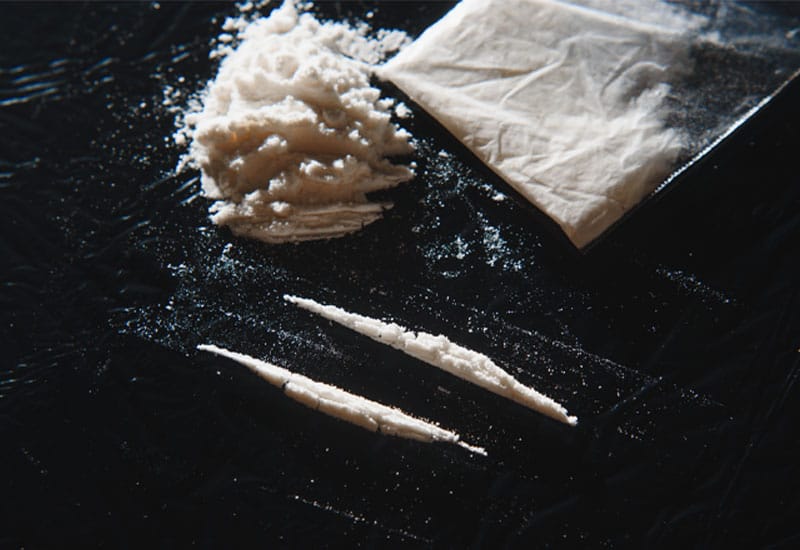What Is Freebasing?
Medically Reviewed By:
Written By:
Updated On: July 21, 2025
Last Medical Review On: July 21, 2025

Table of Contents
Key Points
- Freebasing turns powder cocaine and other substances into a smokable form that reaches the brain within seconds and creates intense but short-lived highs.
- The process involves dangerous chemicals like ether or ammonia that can cause explosions, fires, and toxic poisoning during preparation.
- Smoking freebase cocaine causes severe damage to the lungs, heart, and brain while creating rapid addiction patterns due to the intense effects.
- Treatment for cocaine addiction requires medical supervision, therapy, and long-term support to manage withdrawal symptoms and prevent relapse.
Freebasing refers to a dangerous method of preparing and using drugs that involves chemically converting powdered drugs, typically cocaine, into a smokable form.. This process creates a highly potent and rapidly absorbed drug that produces intense but short-lived effects.
The term became widely recognized during the crack cocaine epidemic of the 1980s, though freebasing differs slightly from crack cocaine in its preparation method. People who freebase cocaine face severe health risks and an extremely high potential for addiction due to the drug’s altered chemical properties.
Cocaine and crack are both powerful brain stimulants, increasing energy levels, enhancing focus, and inducing feelings of euphoria. They work by affecting dopamine, a chemical messenger in the brain. Dopamine is associated with pleasure and motivation.
Freebasing: The Basics
Freebasing often refers to transforming powder cocaine into its base form by removing its hydrochloride salt through a chemical process.[1] This process typically involves mixing powder cocaine with a strong basic pH substance like baking soda and water, then heating the mixture to create a solid, smokable substance. The resulting product has a lower melting point than powder cocaine, allowing people to smoke it and deliver the drug directly to the lungs and bloodstream. This method bypasses the digestive system and upper respiratory membranes entirely, creating much faster and more intense effects than snorting or injecting cocaine powder.
The smoking process involves heating the freebase cocaine in pipes, makeshift devices, or other apparatus to create vapors that can be inhaled. The drug reaches the brain within seconds of inhalation, producing an immediate and powerful high that typically lasts only five to ten minutes.[2] This rapid onset and short duration create a cycle where people quickly seek more of the drug to maintain the effects, leading to compulsive use patterns.
Freebasing cocaine vs crack cocaine differ primarily in the preparation method, though both produce similar smokable forms of cocaine. While crack cocaine uses baking soda and water in its preparation, cocaine freebasing often involves more dangerous solvents like ether or ammonia. Both methods create highly addictive substances that pose severe health risks, but freebasing with volatile solvents carries additional dangers of explosions, fires, and toxic chemical exposure during preparation.
Is Freebasing Used For Drugs Other Than Cocaine?
Freebasing techniques can be applied to drugs other than cocaine, although cocaine remains the most commonly associated substance with this preparation method. People sometimes freebase heroin to create a smokable form, though this practice is less common than other methods of heroin use. Methamphetamine can also undergo similar chemical processes to create a smokable product, though the drug is already commonly smoked in its crystal form without additional chemical conversion.
Some people attempt to freebase prescription opioids like oxycodone or fentanyl to make them smokable, but these modifications are extremely dangerous and often ineffective. The chemical structures of these medications are not always compatible with freebasing processes, and the additives in pharmaceutical formulations can create toxic byproducts when heated. These attempts significantly increase the risk of overdose, poisoning, and other life-threatening complications.
The Risks of Freebasing
Freebasing creates severe immediate and long-term health risks that can result in permanent damage or death:[3]
- Explosion and fire hazards: The volatile solvents used in freebasing can ignite or explode during preparation, causing severe burns, property damage, and death.
- Toxic chemical exposure: Inhaling residual solvents like ether or ammonia can cause poisoning, respiratory system damage, and organ failure.
- Rapid addiction development: The intense, short-lived high creates compulsive use patterns and physical dependence within days or weeks.
- Severe respiratory damage: Smoking freebase cocaine destroys lung tissue, causes chronic cough, and increases the risk of pneumonia and other infections.
- Cardiovascular complications: Heart attacks, strokes, and irregular heart rhythms can occur even with first-time use due to the drug’s intense effects.
- Mental health deterioration: Paranoia, hallucinations, violent behavior, and severe depression commonly develop with continued use.
- Overdose risk: The rapid absorption and high potency make it easy to consume fatal amounts accidentally.
- Legal consequences: Possession and use of freebase cocaine carry severe criminal penalties, including prison time and permanent criminal records.
- Financial devastation: The expensive and compulsive nature of freebasing quickly depletes savings, leads to debt, and destroys financial stability.
How Freebasing Harms Your Health
Freebasing inflicts severe damage to multiple organ systems due to the toxic chemicals involved in preparation and the intense effects of smoking cocaine. The lungs suffer immediate and long-term harm from inhaling superheated vapors and chemical residues, leading to chronic respiratory problems, pneumonia, and permanent scarring of lung tissue.
The cardiovascular system experiences extreme stress from the drug’s rapid absorption, causing dangerous spikes in heart rate and blood pressure that can trigger heart attacks, strokes, and potentially fatal abnormal heart rhythms.. Brain damage occurs through reduced oxygen flow, seizures, and the direct toxic effects of both cocaine and preparation chemicals on nerve tissue.
The preparation process exposes people to dangerous solvents like ether, ammonia, and other volatile chemicals that cause immediate poisoning symptoms and long-term organ damage. These toxic substances can damage the liver, kidneys, and nervous system even before the drug is consumed. Chronic freebasing leads to severe malnutrition, dramatic weight loss, and compromised immune function that makes people vulnerable to infections and diseases.
Cocaine Abuse and Addiction
Cocaine addiction develops rapidly, regardless of the form used, but freebasing cocaine and smoking crack create particularly severe addiction patterns due to their intense and short-lived euphoric effects.[4]
When people smoke freebase cocaine through a glass pipe, the drug reaches the brain within seconds, producing an immediate high that triggers massive dopamine release. This intense rush lasts only minutes, creating powerful cravings that drive compulsive use and increase the risk of addiction significantly compared to powder cocaine use. The rapid cycle between euphoria and crash leads to dangerous binges where people repeatedly smoke freebase cocaine, dramatically increasing their risk of overdose, heart attack, and other life-threatening complications.
The transition from occasional cocaine use to severe addiction happens more quickly with freebasing than with other methods of ingesting the drug due to the drug’s altered chemical properties and delivery method. The freebase form bypasses the slower absorption rates of cocaine hydrochloride, creating stronger withdrawal symptoms and more intense cravings between uses. Mental health deteriorates rapidly as people experience mood swings, psychosis, paranoia, and depression from the extreme fluctuations in brain chemistry.
Addiction Treatment For Cocaine
Cocaine addiction treatment requires comprehensive medical and psychological support to address both the physical dependence and underlying factors that contribute to substance abuse. Professional treatment typically begins with medically supervised detox to manage withdrawal symptoms safely, as cocaine withdrawal can cause severe depression, intense cravings, and suicidal thoughts that require clinical monitoring.
Treatment centers offer both inpatient and outpatient programs that combine evidence-based therapies like cognitive behavioral therapy (a type of psychotherapy that helps patients change harmful thoughts and behaviors), contingency management (a type of therapeutic positive reinforcement), and group counseling to help people develop coping strategies and address triggers that lead to drug use. Mental health professionals work with patients to treat co-occurring disorders like depression or anxiety that often fuel cocaine addiction.
Recovery from cocaine addiction involves long-term commitment and ongoing support beyond initial treatment programs. Aftercare services include continued therapy sessions, support groups, and regular check-ins with healthcare providers to prevent relapse and maintain well-being throughout the recovery journey. Many people benefit from inpatient intensive treatment programs that provide care in a structured environment away from triggers to use cocaine.
Frequently Asked Questions About Freebasing Drugs
What makes freebasing so dangerous compared to other forms of drug use?
Freebasing creates multiple serious dangers, including fire and explosion risks from volatile chemicals used in preparation, severe lung damage from inhaling superheated vapors, and rapid addiction development due to the intense but short-lived high. The preparation process exposes people to toxic solvents that can cause poisoning, while the smoking method delivers drugs to the brain within seconds, creating powerful cravings and compulsive use patterns that are extremely difficult to break.
Can you survive a freebasing overdose?
Freebasing overdoses can be fatal due to the rapid absorption and high potency of the drug. Overdose symptoms include seizures, a heart attack, a stroke, difficulty breathing, and loss of consciousness. Immediate medical attention is critical for survival, as emergency responders may need to provide life support and medications to counteract the drug’s effects. The risk of fatal overdose increases significantly with freebasing due to the difficulty in controlling dosage when smoking.
How quickly does addiction develop with freebasing?
Addiction to freebase drugs can develop within days or weeks of first use due to the intense euphoric effects and rapid onset. Some people are addicted with the first use. The short duration of the high creates a cycle where people quickly seek more of the drug, leading to compulsive use patterns. This rapid addiction development is much faster than with other forms of drug use, making freebasing extremely dangerous even for experimental or occasional users.
What are the signs that someone needs professional help for freebasing addiction?
Signs include inability to stop using despite serious health problems, dramatic weight loss, chronic respiratory issues, paranoia or psychosis, financial devastation, and engaging in dangerous behaviors to obtain drugs. Physical signs like burns from preparation accidents, chronic cough, chest pain, and extreme mood swings also indicate the need for immediate professional treatment. Anyone experiencing these symptoms should seek help from addiction treatment centers or medical professionals immediately.
There is a Better Way to Live. It's Time to Get the Help You Deserve.
Take the first step in getting your life back. Speak with our admissions team today.Sources
[1] Tashkin, D. P., Simmons, M. S., Coulson, A. H., Clark, V. A., & Gong, H. (1987). Respiratory Effects of Cocaine “Freebasing” Among Habitual Users of Marijuana With or Without Tobacco. Chest, 92(4), 638–644. https://www.sciencedirect.com/science/article/abs/pii/S0012369216312260 on August 1, 2025
[2] Tashkin, D. P., Gorelick, D., Khalsa, M. E., Simmons, M., & Chang, P. (1992). Respiratory effects of cocaine freebasing among habitual cocaine users. Journal of Addictive Diseases, 11(4), 59–70. https://pubmed.ncbi.nlm.nih.gov/1486094/ on August 1, 2025
[3] Meisels, I. S., & Loke, J. (1993). The pulmonary effects of free-base cocaine: a review. Cleveland Clinic Journal of Medicine, 60(4), 325–329. https://www.ccjm.org/content/ccjom/60/4/325.full.pdf on August 1, 2025
[4] Cleveland Clinic. (2023, October 23). Cocaine (Crack). Cleveland Clinic. https://my.clevelandclinic.org/health/articles/4038-cocaine-crack on August 1, 2025



